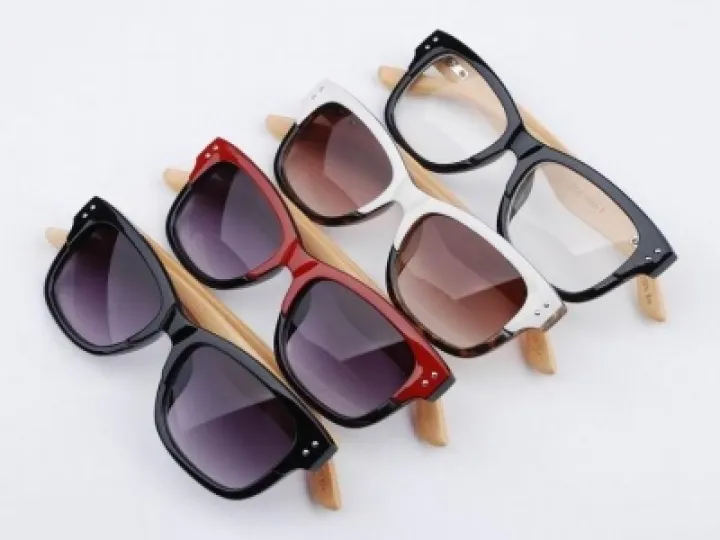A closer look at glasses frames
Frames are as crucial as lenses
Most people buying spectacles or sunglasses look at the lenses first. They ask themselves whether the lenses have the proper shape, shade, and style. Frames tend to take a back seat in the buying process, but they deserve a closer look – the structure of your glasses can make a big difference to how you look and feel.
The materials that make up glasses frames may determine the lenses' size and weight, the type and style of the hinge for the arms, the bridge, and other factors. Frames are split into two basic camps, metal or plastic, with various hybrid combinations and into smaller camps such as wood, bamboo and other materials.
Metal glasses frames
Metal frames on glasses are usually thin, lightweight and durable. Materials most favoured in manufacturing are aluminium, stainless steel, and titanium. Even the thinnest metal frames can support large lenses, unlike plastic frames, which tend to be much thicker.
Aluminium frames are trendy, especially among men. Aluminium frames usually come in conservative colours, but their selling point is weight and durability. Aluminium is lightweight, hypoallergenic and resists heat, corrosion and abrasion. Aluminium frame repair presents some problems as they can be difficult to weld, but the specialised equipment at AlphaOmega overcomes these drawbacks.
Also popular with men are glasses frames made from titanium or titanium alloys that make very durable but lightweight frames. Titanium frames also offer more colours than metals such as stainless steel. Titanium laser weld equipment installed at AlphaOmega makes titanium frame repairs a breeze.
Flexon is a metal alloy widely used in the spectacles frame industry. Popular with sports enthusiasts, it can retain its original shape even after bending or twisting, giving it the 'memory metal' nickname. The titanium base is durable, but the added alloys make them far more flexible.
Stainless steel frames are lightweight, durable and hypoallergenic, but relatively more expensive than other metal frames. Many contain chromium to add resistance to corrosion, abrasion and heat. Colour used to be a problem with many frames, but they now come in a bewildering variety of finishes. However, most prefer the 'metal' look, with either a shiny or matte finish.
Plastic glasses frames
Once rather bulky, heavy, brittle plastic frames have leapt forward with the tremendous technological advances in recent years. Modern plastics, mostly cellulose acetate blends, combine strength with thin, lightweight frames. They may not be as thin and sturdy as metal alloys, but they are good enough to provide a lightweight lens frame without overpowering them.
Cellulose acetate or zylonite is one of the cheapest and best options for sunglasses manufacturers. It is a lightweight, flexible material that can be layered in many colours. Nylon is made from petroleum products, and nylon frames are usually a blend of several nylons. Nylon is often chosen for sportswear glasses because it can withstand heat and cold without becoming brittle.
Sports enthusiasts also prefer polycarbonate plastics as the frames offer optimum impact resistance. It's a sturdy and versatile plastic, but it comes at a price, and this eyewear tends to be more expensive.
Hybrid glasses frames
Spectacles and sunglasses don't need to be made of one particular material. Most hybrids use plastic for the lenses and metal for the arms, but this theme has plenty of variation. Modern designers also opt for the retro look, and ecological issues have become prominent in recent years. The up-and-coming Colin Leslie uses bamboo , grown chiefly in Asian plantations, while Stella McCartney favours plastics made from recycled acetate.
It's all in the detail
The small parts of spectacle frames often cause the most problems for the glasses repair industry. Hinges are usually made of metal and are frequently 'hidden' in the elbow of the arm. A weak hinge mechanism can be problematic if it becomes loose or slightly bent. Nothing looks or feels worse than glasses that don't balance properly on the ears, and misaligned arms caused by bent hinges are often the biggest culprit.
Nose pads can be another problem area. Plastic sunglasses can do away with them, but thin metal spectacle frames must feel comfortable. Silicone nose pads are widely used; they are flexible and soft yet 'grip' the nose better. Silicone nose pads, being porous, will absorb dirt and sweat, so it's advisable to replace them at least once a year. Vinyl nose pads are an excellent alternative but are more rigid and less comfortable. Titanium is the most rigid but has the advantage of being sturdy and hypoallergenic.
Many of the metal frames made today, and even some plastic ones, are given a special lacquer coating to reduce corrosion and improve the cosmetic effect. Conventional coatings include polyurethanes and epoxy resins. Lacquers are sprayed as a liquid or applied as a powder, then heated until they liquefy. In any event, much more goes on in manufacturing and repairing spectacles and sunglasses than meets the eye.
More on glasses repair
Materials matter.
Titanium takes off.
Cost of glasses repair.
Care tips for sunglasses.

